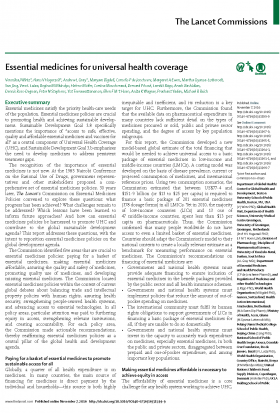This website uses cookies so that we can provide you with the best user experience possible. Cookie information is stored in your browser and performs functions such as recognising you when you return to our website and helping our team to understand which sections of the website you find most interesting and useful.
Essential medicines for universal health coverage (2016)

Details
Veronika J Wirtz*, Hans V Hogerzeil*, Andrew L Gray*, Maryam Bigdeli, Cornelis P de Joncheere, Margaret A Ewen, Martha Gyansa-Lutterodt,
Sun Jing, Vera L Luiza, Regina M Mbindyo, Helene Möller, Corrina Moucheraud, Bernard Pécoul, Lembit Rägo, Arash Rashidian,
Dennis Ross-Degnan, Peter N Stephens, Yot Teerawattananon, Ellen F M ‘t Hoen, Anita K Wagner, Prashant Yadav, Michael R Reich
Essential medicines satisfy the priority health-care needs of the population. Essential medicines policies are crucial to promoting health and achieving sustainable development. Sustainable Development Goal 3.8 specifically mentions the importance of “access to safe, effective, quality and affordable essential medicines and vaccines for all” as a central component of Universal Health Coverage (UHC), and Sustainable Development Goal 3.b emphasises the need to develop medicines to address persistent treatment gaps.
The recognition of the importance of essential medicines is not new. At the 1985 Nairobi Conference on the Rational Use of Drugs, government re presentatives and other stakeholders proposed a comprehensiveset of essential medicines policies. 30 years later, The Lancet’s Commission on Essential Medicines Policies convened to explore these questions: what progress has been achieved? What challenges remain to be addressed? Which lessons have been learned to inform future approaches? And how can essential medicines policies be harnessed to promote UHC and contribute to the global sustainable develop ment agenda? This report addresses these questions, with the intent to reposition essential medicines policies on the global development agenda.
The Commission identifi ed fi ve areas that are crucial to essential medicines policies: paying for a basket of essential medicines, making essential medicines affordable, assuring the quality and safety of medicines, promoting quality use of medicines, and developing missing essential medicines. The Commission located essential medicines policies within the context of current global debates about balancing trade and intellectual property policies with human rights, assuring health security, strengthening people-centred health systems, and advancing access to essential technologies. In all policy areas, particular attention was paid to furthering equity in access, strengthening relevant institutions, and creating accountability. For each policy area, the Commission made actionable recommendations, thereby reaffi rming essential medicines policies as a central pillar of the global health and development agenda.
Full Text: http://www.thelancet.com/journals/lancet/article/PIIS0140-6736(16)31599-9/abstract




